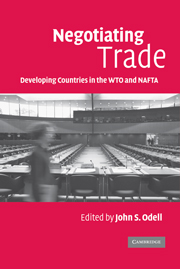Book contents
- Frontmatter
- Contents
- List of figures
- List of tables
- List of contributors
- Acknowledgments
- 1 Introduction
- Part I Multilateral negotiations
- Part II Regional negotiations
- Part III WTO Dispute Settlement Negotiations
- 7 Do WTO rules create a level playing field? Lessons from the experience of Peru and Vietnam
- 8 Compliance bargaining in the WTO: Ecuador and the bananas dispute
- Index
7 - Do WTO rules create a level playing field? Lessons from the experience of Peru and Vietnam
Published online by Cambridge University Press: 22 September 2009
- Frontmatter
- Contents
- List of figures
- List of tables
- List of contributors
- Acknowledgments
- 1 Introduction
- Part I Multilateral negotiations
- Part II Regional negotiations
- Part III WTO Dispute Settlement Negotiations
- 7 Do WTO rules create a level playing field? Lessons from the experience of Peru and Vietnam
- 8 Compliance bargaining in the WTO: Ecuador and the bananas dispute
- Index
Summary
Introduction
Scholars of international relations and the NGO groups protesting on the streets of Seattle in 1999 share a common assumption. Both believe that less developed countries are at a disadvantage when negotiating with more powerful counterparts. Smaller market size makes it ineffective for developing countries to use threats of retaliation in order to combat discrimination against their goods. In contrast, retaliation measures taken by larger economies can easily cause severe damage to a smaller economy. This leaves developing countries vulnerable to discriminatory trade policies adopted by their major trade partners.
In spite of their apparent lack of bargaining leverage, however, in some negotiations developing countries have been able to achieve positive outcomes – even the overturn of protectionist measures against their exports by the United States and EU. Simply evaluating the relative market power of the two sides in an economic negotiation is inadequate. As Odell argues, the strategies used in the negotiation process matter as much as the material resources of each participant. In addition, the institutional context of the negotiation can generate pressure for liberalization. For trade negotiations, the institutional context is shaped by the General Agreement on Tariffs and Trade (GATT) and its successor the World Trade Organization (WTO). The GATT/WTO system upholds trade rules that apply equally to rich and poor countries alike and are enforced by a third party adjudication process to settle disputes. The WTO dispute settlement procedures provide developing country.
- Type
- Chapter
- Information
- Negotiating TradeDeveloping Countries in the WTO and NAFTA, pp. 219 - 256Publisher: Cambridge University PressPrint publication year: 2006
- 19
- Cited by

